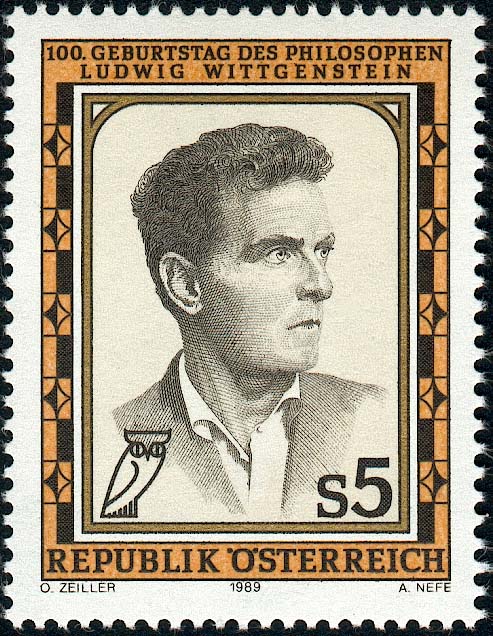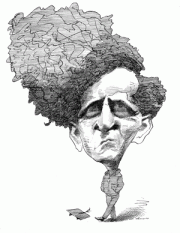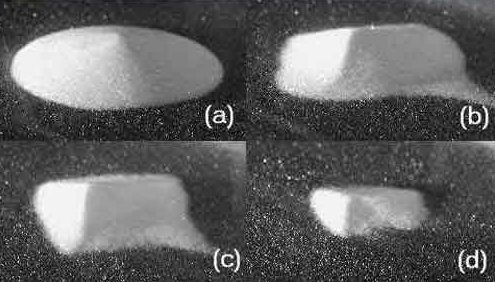Stuck between two things
Philosophy is the battle against the bewitchment of our intelligence by means of our language. PI 109
Reading a lot of Wittgenstein at the moment. A moral from the Philosophical Investigations:
 Many problems come from our wanting to treat something as something it is not. For Wittgenstein, this was treating the meaning of words as something in some special realm, or treating thoughts as mental objects to which only I have access.
Many problems come from our wanting to treat something as something it is not. For Wittgenstein, this was treating the meaning of words as something in some special realm, or treating thoughts as mental objects to which only I have access.
The solution is to look at how we use words and what actually goes on and figure out from that how to treat things. Starting with an idea of what something is and then forcing the thing into that idea only leads to problems.
The same basic problem is faced with the incursion of the scientific attitude into non-scientific areas of language.
We want to treat depression as a medical problem, with an entirely biological explanation, but this makes the fact that we often “catch” depression from events in our life seem quite odd – (“queer” in Wittgenstein’s terms).
We want to treat religion as making factual claims about the universe, but this makes the fact that people are converted to a religion and not just educated about it seem odd.
We want to believe that our experience takes place in the brain, but that makes the shared world we live in an odd place.
We want there to be a firm separation between subjective and objective so that we can put everything on the objective side in a bag marked truth and discard everything else as lightweight. But when we look at the world we find it much harder to fit things into the bag. What, for example, is money? Without our “subjective” acceptance of its value, the objective marks on paper or gold atoms are literally worthless.
I haven’t really understood it yet, but I think I’m on the right track.
The heap
An ancient philosophical dilemma. How many grains of sand are there in a heap?
From wikipedia: The paradox of the heap (Sorites paradox) is an example of the paradox which arises when one considers a heap of sand, from which grains are individually removed. Is it still a heap when only one grain remains?
My solution is this. A heap of sand is a thing. A heap of sand is a concept. We are able to use the word to describe it, are able to use arguments and justifications in borderline cases. Each heap of sand is also a number of sand particles. The number of sand particles in heaps as opposed to piles or mounds is based on counting the sand in piles we decide are heaps. The edges of the definition are ambiguous, the existence of heaps of sand is not. Under certain conditions we might be happy to set a number, in others to take survey results, in another become totally confused and be unable to decide.
The argument is that we live our lives in a world both material and conceptual. This duality means facts about the world are fundamentally ambiguous. The material facts about sand can’t tell you how many grains are in a heap. The grammar of the word heap cannot tell you the chemistry of sand.
But the concept does not exist in the material world – we stand towards the world as if it is conceptually organized, there is no space for thought, for conscious interpretation. Any yet we share the concepts. They are communal. They are not my creation, but ours.
There are two basic epistemologies – the foundational of reductive science, and the contextual, of expansive conceptual life.
Scientific truth is ambiguous. The thing is matter organised conceptually, not either just matter or just concept. The boundaries of the heap are not consciously decided by us, the decision is made in the way we use the concept – the way we talk about heaps in different contexts. But it is still the thing there, the grains piled up. With both physics and gramatical certainty as its basis.
In the world there is such overlap between matter and concept that we become confused about how we are able to talk. We fear ambiguity lets in mystery, that it throws things somehow up in the air, but in reality an enmeshed and interweaved ambiguity is everywhere in our lives. That something is ambiguous does not mean that it is nothing (although it is nothing useful for science).
With the certainty of science glaring down at us, we are tempted to say there is no heap, the heap is just in our minds. That is the start of all this bother.
The philosopher
 Philosophy is more rubbish than science by a mile.
Philosophy is more rubbish than science by a mile.
The first problem is how they fill their time – writing peer-reviewed papers, spending time researching and going to conferences, teaching undergraduates. What use is it for most people? Greatest philosophical breakthrough of the last 20 years anyone?
The extreme positions have already been plotted. There are no discoveries in philosophy.
While their modus operandi mimics science, they are so scared of the rigor, certainty and force of scientific argument, that they keep themselves hidden, quiet little mice of academia, making sure not to rock the boat and draw attention. Tending to a career.
Worst of all, they come up with words like ontology and epistemology (will write next), they debate the hard problem of something everyone does all the time. They use words which ring-fences unfathomable complexity; minute detail. (Such that surely only a professional philosopher could comprehend, of course.)
Well guess what? Philosophy is a science as much as documentary making or being a novelist.
There is the same difference between academic philosophers and philosophers as between english literature professors and novelists (of course they do sometimes overlap).
The subject matter is philosophy. Books and essays and arguments about abstract, conceptual matters.
Except there are no bastard philosophers to be seen. Plenty of novelists, but no philosophers. They used to exist. But now they don’t. They got swallowed up by the scientific attitude (and the old philosophers didn’t help by being utterly impenetrable).
Here is the definition. Philosophy is creative abstract thought. It is that easy.
Is there a need for philosophy? Doesn’t academic theory of philosophy that university professors do look pretty similar?
The old philosophers failed not in intent or genius but in accessibility. The biggest criticism of the best of them was arrogance and elitism. They created no vehicle for their ideas to get outside of a select few (perhaps they were squashed by religion).
My idea of philosophy is obviously a romantic ideal. Don’t you think its worth aiming for?
Faith, religious and non-religious, cannot defend itself from science (or rather in more confusing and accurate terms, all of a certainty’s defences against science are founded on connected certainties). Philosophy should be the buffer between science and life. Philosophy should be telling science to back off.

1 comment